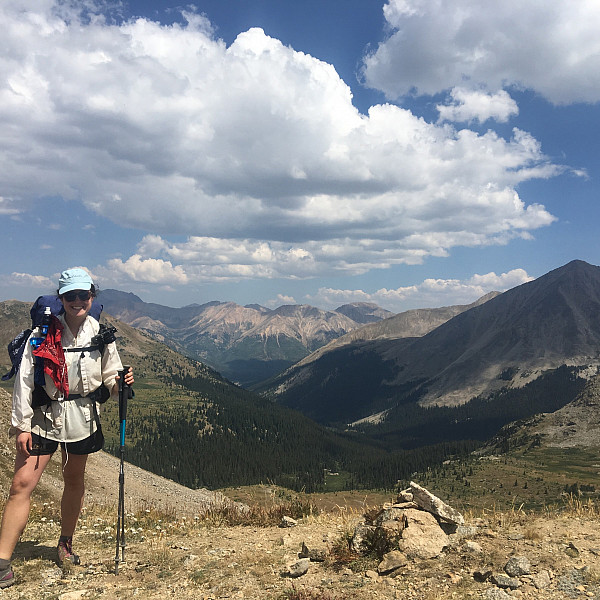News
Emma Davis ’14 Is on a Boat!
July 23, 2019
July 23, 2019
Open gallery
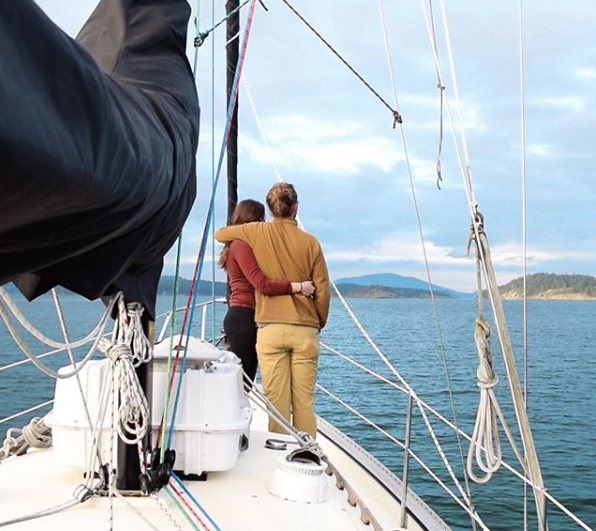
“I certainly would not be doing this if it was not for Southwestern and the family that took me under their wing there,” Emma Davis ’14 says of her latest adventure.
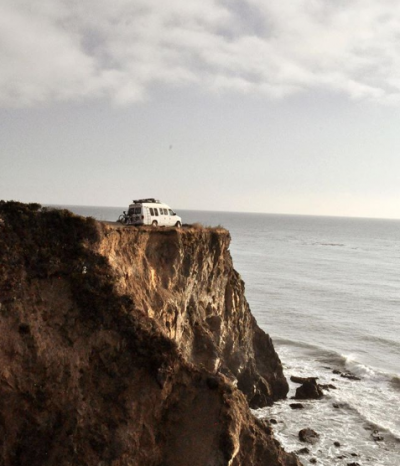
Where they go after that remains up in the air. All Davis knows is that (1) the Pacific Northwest is a wonderfully beautiful opposite from central Texas and (2) she could never have guessed that living on the ocean is where her young life would lead.
“Being from San Antonio, there’s nowhere for us to sail, and that’s not even a thing that we think about. We think about—I don’t know, maybe tacos?” she jokes. But it was Eicher’s lifelong dream to sail the world, and Davis was both intrigued and eager to join him, so she learned how to sail. “For him, it was more about sailing; for me, I want to see the world, and sailing sounded like a really interesting and awesome and beautiful way to do it,” she says excitedly. “I’m sure it’ll be terrifying at times, but I’m more than ready for that adventure, and we’ll be prepared. It won’t be a sailing off to the sunset every single day. It’ll be scary, and there will be crazy wind and rain. But we’ll have to trust each other and know the boat and handle it together. We’ll get through it, absolutely.”
Learning the ropes
Just nine years ago, Davis was a first-year student at Southwestern University. She was considering majoring in biology while catching and tagging salamanders in a lab taught by Lillian Nelson Pratt Chair and Professor of Biology Ben Pierce, but when she discovered that she could major in environmental studies, she knew she had found her niche. She quickly added an anthropology minor. Davis remembers “absolutely falling in love with the interconnectedness between anthropology and the environment. I just thought the two perfectly described what I was interested in.”
She especially appreciated learning from Associate Professor of Anthropology Brenda Sendejo and Professor of Anthropology Melissa Johnson. She calls Professor of Sociology Maria Lowe her “wacky MVP,” and she always looked forward to classes with Associate Professor of Environmental Studies Joshua Long, whom she describes as “so cool. He made the most boring subjects we were learning about interesting, exciting, and applicable.”
Davis attributes her ways of thinking about her excursion to her Southwestern education, and although she possesses a wonderfully audacious spirit, it’s clear that she’s learned how to privilege social consciousness over her own enjoyment. “Really, I don’t think I would be approaching this adventure with as conscious of a lens as I am if I hadn’t taken anthropology and sociology courses,” she says. For example, Davis and Eicher will be winding their way through a number of small remote islands during their voyage, and they want to be sure they’re respectful of whether they’d be welcome and the impacts they would have on the residents, on their day-to-day lives, and on the islands themselves. That mindfulness extends to the plastic waste the couple generate on their boat: they will recycle and reuse what they can while dumping their refuse only where its environmentally appropriate to do so. She says that a lot of other cruisers fail to consider such factors, instead barging onto the usually unvisited beaches, throwing parties, and leaving without reflecting on how they’ve affected the native islanders. “We have to be conscious of our every movement. …Without my anthropology and sociology classes, I wouldn’t be able to be aware enough to think about that.”
Davis attributes her ways of thinking about her excursion to her Southwestern education, and although she possesses a wonderfully audacious spirit, it’s clear that she’s learned how to privilege social consciousness over her own enjoyment.
Her environmental studies major also informs the expedition. At Southwestern, she was especially taken with studying water quality in her Geographic Information Systems (GIS) classes. “I was absolutely fascinated by the GIS classes,” she recalls. “That opened up a whole new world for me. And it’s a skill, too. In this new sailing adventure we’re going on, I know I’ll be using it so much.” For example, she and Eicher will use GIS to help them navigate and steer clear of other vessels, underwater protuberances, and other potential hazards.
In addition, studying the environment in college helped inspire Davis’s desire to embark on the sailing life. “One of the many reasons we’re doing this is so we can live a sustainable lifestyle,” she reveals. On the boat, they use renewable energy sources, such as solar and wind, to generate their own electricity, and they’re also using their sails, which helps minimize their carbon footprint. “That’s something we’re both so excited about: living as simply and as self-sufficiently as we can,” Davis says. “It’s possible with this boat that we can be out on the water for a month or two without ever having to go on land if we bring enough food, which is pretty incredible to think about.”
Beyond her academic training, Davis says she wouldn’t have had the confidence to take on this experience if it weren’t for her professional mentors in the Provost’s Office, where she worked during her years at SU. She thinks affectionately of Barbara Jean, executive administrative assistant for the Office of the Dean of the Faculty; Julie Cowley, associate vice president for academic affairs; and Christine Vasquez, senior administrative assistant for integrative learning as her “third, fourth, and fifth moms.” Whenever Davis would encounter a problem during her undergraduate years, she says, “I would go to them, and they would give me the best advice, and they would always push me and motivate me. … Just being with them taught me so much about myself.” She will return to the life lessons they taught her and remember their cheerleading when the going gets rough on the high seas. “This adventure seems really scary to me right now,” Davis admits, “but it’s also really exciting, and I know that I have these women pushing and supporting me through it all.”
In the offing
You might assume that if Davis and Eicher are traveling around the world, they must be sitting on a pile of pirate’s treasure. But you’d be wrong: before setting off on their journeys, Davis was a seventh- and eighth-grade science teacher in San Antonio while Eicher was working for his family’s pest-control company.
Davis discovered her love for teaching during two Southwestern-related experiences: working for Cowley as her daughter’s nanny and studying abroad. “If it weren’t for nannying, if it weren’t for taking care of Kate, I would not be a teacher,” she says. “Seeing her grow from preschool all the way up to third grade was transformative. Being with her every day and just doing homework with her and seeing how she learned was incredible.” That interest in mentoring and educating children was reinforced while Davis was examining whether tea and coffee farms were producing fair-trade and organic products in Nepal one semester. She found herself interacting with the local children and “fell in love with teaching.”
So after graduating from Southwestern, Davis was accepted into the Teach for America program. She completed a teacher boot camp in Houston and was assigned her first job at Rhodes Middle School in San Antonio. Davis acknowledges that she was initially disappointed at being stationed back in her hometown, but she soon realized that “it was so wonderful to be able to relate to the kids about growing up in San Antonio. I didn’t know how much being from the same city would really give me a deeper connection with the kids.” She “absolutely loved” teaching, building relationships with her students and eventually being promoted to department chair as well as a Teach for America coach for other teachers. “Daniel and I have an Instagram for our travels, and most of our following is my kids,” she giggles.
A few years into teaching, Davis and her Labrador–chow chow–Rhodesian ridgeback mix Jagger met Eicher and his terrier–pit bull mix Stella at the local dog park. The dogs got on famously, as did their humans. On only their second date, Eicher was frank about his plans. “If you want this to continue, I have this old house, and I need to tear out these counters by tomorrow. Would you mind doing that with me?” Then, he told her why he wanted her help: Eicher was renovating it so that he could list the property on Airbnb—a source of income that would eventually help fund what he hoped would be a journey around the world on a sailboat. Was she interested in joining him?
Some might have balked at the proposition; the home remodeling alone might have sent some less fearless souls running—and did I mention that this was only their second date? But Davis was game. The house turned out to be a 100-year-old duplex in an up-and-coming neighborhood in San Antonio. “It didn’t have any electricity, and we were laying down in rat poop and dirt, tearing out these counters,” Davis recalls. But they got the job done by the end of the night.
And that was how they spent every day of the first year of their relationship: remodeling an entire house, room by room. Davis would come home after school, change out of her teaching clothes, grab a swig of water, and get down to demolishing and renovating.
Getting underway
While they were refurbishing and readying their Airbnb property, the couple also saved money by “living pretty cheap,” as Davis puts it. Their occasional dates would often entail bike rides around the city or maybe a cup of coffee every so often. Then, after coordinating a sailing trip in Seattle with the more experienced couple who would teach them what they had learned on their own round-the-world journeys, Davis and Eicher decided they would experiment with van life for the summer. “We wanted to just see the U.S. before we left on this sailing adventure,” Davis says. “We thought, We’re going to see the world, so we might as well see the country we live in.”
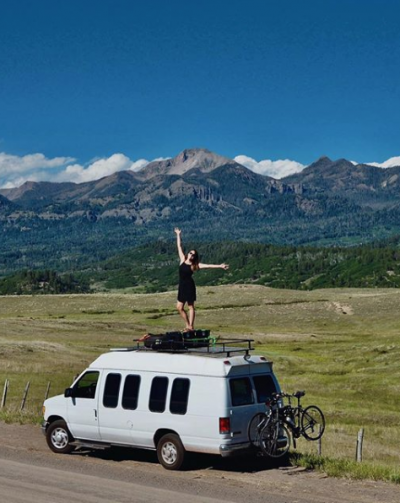
“We had so much fun!” Davis rhapsodizes. “It was incredible. We met so many wonderful people. Even when we had a flat tire in the middle of nowhere, California, this guy helped us and gave us a tire from his backyard. It was awesome.” When asked whether she missed any of the trappings of life not on the road, the Southwestern grad admits, “I’d be lying if I said I didn’t miss having a real shower and a bathroom. But I had to remind myself that not many people get to do this. We were seeing the country, and we were living in the wilderness. It’s all part of it; you just have to accept it.” She even attributes her ability to weather van life to her undergraduate education: “You just gotta do it! Southwestern teaches you to be bold and be yourself. It’s scary, and it’s so unknown, but it’s so worth it to test yourself.”

Edging ever forward
Davis and Eicher reached Seattle in October 2018. There, they successfully undertook their sailing trip. They then spent time crisscrossing the U.S. in their van, including a trip to Eicher’s home state of Maryland and along the East Coast, to look at sailboats for sale. By January, they were traveling again from San Antonio to Anacortes, Washington, because they had finally found the vessel they wanted. They closed on the sailboat, originally named Full Code, in January and moved their belongings from the van to the newly christened Indy the following month. Since then, they’ve been sailing around the Puget Sound, working on the boat, getting acquainted with their new home, taking her out for brief trips, and encountering all manner of wildlife, including seals, sea lions, and superlatively cute otters.
All the while, Davis has been picking up odd jobs, tutoring, substitute teaching, and editing for an education journal. She also sells lab activities and worksheets on Teachers Pay Teachers, an online marketplace for instructors seeking or selling educational resources. She says that she hasn’t had trouble finding various remote work opportunities, which supplement the couple’s Airbnb income.
“The beautiful thing about living in a van—and sailing, too—is that it doesn’t cost very much,” she says. “You’re not paying rent every month with utilities. You’re just paying for gas and groceries, but the amount of groceries that you buy when you live in a small space is less than when you have a humongo refrigerator to fill. It’s cheaper, and your money goes much, much further, which is wonderful.” She adds that she did initially worry that she and Eicher might run out of money, stay broke, and flounder, “but no, we’re resourceful, and you figure it out. As long as you’re smart about it and know how to market yourself and your skills, you’re good. …You can really see the power of communicating with other people about what’s going on in your life and how they can help. It’s wonderful. We’re making it work.”
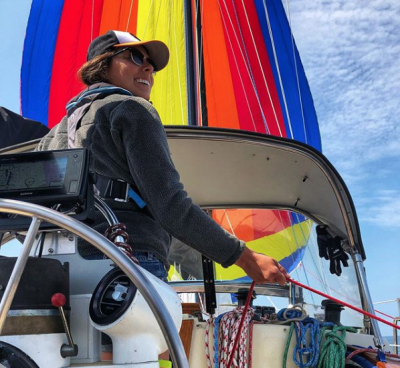
Davis feels that “right now is the perfect time” to undertake this whirlwind adventure with Eicher. Although she does look forward to marrying and having children at some point, being free of those ties today makes the excursion possible. “And if not now, then when?” she asks. “You have to be strong mentally and physically for sailing, and even living in a van is pretty stressful. We don’t want to do that when we’re retired and old and our bodies won’t let us. We want to do it now, when we’re young and have nothing really here keeping us.”
Meanwhile, Eicher is inspired by a quotation that is often wrongfully attributed to St. Augustine, but it’s more a version of a proverb that first gained popularity in the eighteenth century in England and France: “The world is an open book, and people who don’t travel only read one page over and over and over again.” He adds, “We want to read all the pages—the entire book.”
The most heartwrenching challenge the couple has faced is having to leave behind the dogs that helped bring them together: Stella is staying with Eicher’s brother, and Jagger is living with one of Davis’s good teacher friends. They didn’t want to leave their furry companions behind, but when they tried going out on the water with their beloved dogs back in San Antonio, the pups would just jump off the boat and return to the shore. “I’m so happy that they are happy and in good homes. That makes me feel much better,” Davis says. “But it doesn’t make us missing them any better, either.” The couple plans to reunite with their landbound canines when they return.
Less difficult but still requiring compromise has been learning how to share such a tiny living space with another person. “Things get smelly, you get in each other’s way, and you get on each other’s nerves. But it’s never anything that you can’t work out. It’s really important to communicate with your partner, obviously,” Davis imparts knowingly. However, she does confess that upgrading from a 10-foot van to a 37-foot sailboat has made things that much easier.
When asked what she enjoys most about the sailing life now, Davis hesitates. “Wow,” she says thoughtfully. “There are so many best parts.” The most significant thing, she thinks, is “just the feeling of being free—in so many ways. I don’t have to go to a job every morning, which is really nice. We can totally dictate what we do with our days, how our energy is being used, what our days will look like, and what we’ll be seeing and doing. That’s really wonderful. I just love seeing new places and experiencing new things and meeting new people. That’s one of the main reasons I wanted to do this: just experience as much as I could.” So many times during their van-life adventure and while sailing around the Pacific Northwest, Davis says, “I’ve just stopped and looked around, really soaking it all in, and thought, Wow, this is my life now. This is so different from what I was doing a year ago. And I feel so much more whole now. My soul feels nourished and happy.”
For the people she and Eicher meet during their travels or who read about their odyssey on social media (and in this story), Davis “hope[s] everyone does something that makes them feel whole. It stinks to feel exhausted all the time and to feel that there’s something still out there, like a skeleton that wants to get out of its body.”
After their West Coast cruise and their journey across the Pacific, Davis thinks they will drop anchor for a while in New Zealand. By that time, the couple will have enough experience sailing that they’ll be able to build a small business: Eicher will fix sails, and Davis will assist him while also making boat accessories, such as seat cushions. Eventually, they will probably make their way to a new destination, such as Indonesia.

For those who might look skeptically at the couple’s new life and think, “I could never just quit my job and pack up and start traveling!” Davis says that she empathizes, having shared exactly the same thought early on in their planning. However, when she really reflected on the possibilities, she says, “When I’m 80 years old, I want to be able to look back and say, ‘Wow, you go, girl! You did that! You conquered it!’ I want to be proud of the life that I have lived and what I’ve accomplished and seen.”
That said, she underscores the importance of planning. “It is so easy to have this kind of life as a goal and to feel overwhelmed about where to start; I was. But it helps to write it all out from beginning to end,” she suggests. Davis also concedes that choosing the nomadic life is not for everyone; for some, the journey might be a road trip or a vacation abroad. Whatever the route, she argues that traveling is life-changing. “Just make a plan, no matter how big or small, and make sure you stick to it!” she advises. “When you do, the sense of accomplishment and gratification is immense. It breaks this ‘big idea’ down into small attainable steps, and before you know it, the dream is happening! I understand this kind of life is not realistic for so many people right now, but anyone can make it a reality if they have a plan and stick to it. Take the leap, and DO IT!”
Since taking the leap herself, Davis has had no regrets. “I feel like I’ve really started to live and experience life as it should be,” she remarks. “I feel so incredibly alive and so incredibly excited about everything.”
Follow Davis and Eichner on their adventures at @yonder.bound on Instagram. A blog and a YouTube channel are also in the works.
















